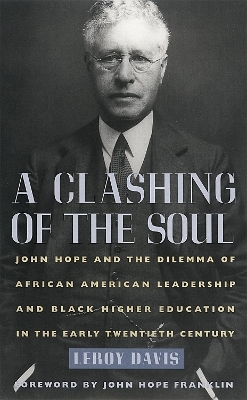
A Clashing of the Soul
John Hope and the Dilemma of African American Leadership and Black Higher Education in the Early Twentieth Century
Seiten
2019
University of Georgia Press (Verlag)
978-0-8203-5704-1 (ISBN)
University of Georgia Press (Verlag)
978-0-8203-5704-1 (ISBN)
John Hope (1868-1936), the first African American president of Morehouse College and Atlanta University, was one of the most distinguished in the pantheon of early-twentieth-century black educators. The story of Hope's life illuminates many complexities that vexed African American leaders in a free but segregated society.
John Hope (1868–1936), the first African American president of Morehouse College and Atlanta University, was one of the most distinguished in the pantheon of early-twentieth-century black educators. Born of a mixed-race union in Augusta, Georgia, shortly after the Civil War, Hope had a lifelong commitment to black public and private education, adequate housing and health care, job opportunities, and civil rights that never wavered. Hope became to black college education what Booker T. Washington was to black industrial education.
Leroy Davis examines the conflict inherent in Hope's attempt to balance his joint roles as college president and national leader. Along with his good friend W. E. B. Du Bois, Hope was at the forefront of the radical faction of black leaders in the early twentieth century, but he found himself taking more moderate stances in order to obtain philanthropic funds for black higher education. The story of Hope's life illuminates many complexities that vexed African American leaders in a free but segregated society.
John Hope (1868–1936), the first African American president of Morehouse College and Atlanta University, was one of the most distinguished in the pantheon of early-twentieth-century black educators. Born of a mixed-race union in Augusta, Georgia, shortly after the Civil War, Hope had a lifelong commitment to black public and private education, adequate housing and health care, job opportunities, and civil rights that never wavered. Hope became to black college education what Booker T. Washington was to black industrial education.
Leroy Davis examines the conflict inherent in Hope's attempt to balance his joint roles as college president and national leader. Along with his good friend W. E. B. Du Bois, Hope was at the forefront of the radical faction of black leaders in the early twentieth century, but he found himself taking more moderate stances in order to obtain philanthropic funds for black higher education. The story of Hope's life illuminates many complexities that vexed African American leaders in a free but segregated society.
LEROY DAVIS is a professor of history at Emory University. He is the coeditor of The African Experience in Community Development: The Continuing Struggle in Africa and the Americas. He lives in Atlanta.
| Erscheinungsdatum | 05.09.2019 |
|---|---|
| Zusatzinfo | 32 b&w photos |
| Verlagsort | Georgia |
| Sprache | englisch |
| Maße | 156 x 235 mm |
| Themenwelt | Literatur ► Biografien / Erfahrungsberichte |
| Sachbuch/Ratgeber ► Geschichte / Politik | |
| Geisteswissenschaften ► Geschichte ► Regional- / Ländergeschichte | |
| Geschichte ► Teilgebiete der Geschichte ► Kulturgeschichte | |
| Sozialwissenschaften ► Ethnologie ► Volkskunde | |
| Sozialwissenschaften ► Pädagogik | |
| Sozialwissenschaften ► Soziologie | |
| ISBN-10 | 0-8203-5704-9 / 0820357049 |
| ISBN-13 | 978-0-8203-5704-1 / 9780820357041 |
| Zustand | Neuware |
| Haben Sie eine Frage zum Produkt? |
Mehr entdecken
aus dem Bereich
aus dem Bereich
der stille Abschied vom bäuerlichen Leben in Deutschland
Buch | Hardcover (2023)
C.H.Beck (Verlag)
23,00 €
vom Mittelalter bis zur Gegenwart
Buch | Softcover (2024)
C.H.Beck (Verlag)
12,00 €
Die Revolution des Gemeinen Mannes
Buch | Softcover (2024)
C.H.Beck (Verlag)
12,00 €


